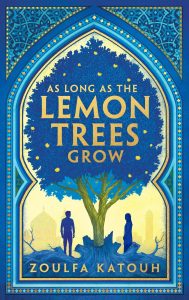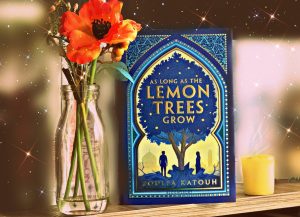AS LONG AS THE LEMON TREES GROW by Zoulfa Katouh (BOOK REVIEW)
“For now, this flag is our shield against the cold winters, the bombs falling from the sky, and the bullets that tear into our bodies. In death it’s our shroud, our corpses swaddled in it as we return to the soil we vowed to protect.”
As Long as the Lemon Trees Grow is the superb YA debut by Zoulfa Katouh. This is a story of the sheer beauty and strength of Syria, of the brutalities of war; it’s a story wrapped in sorrow and grief but also injects hope.
Salama Kassub, at the tender age of just eighteen was a pharmacy student, she had a mother and father who loved her dearly, a brother and sister in law who thought the world of her. She was just an ordinary teenager on the cusp of a prosperous future. Then the waves of war and revolution washed over her homeland, Syria, and in its wake left her entire life in ruins. Now Salama is thrust into the role of a doctor, for there are so few left. Everyday she sees blood, disease and death as the wounded never cease to arrive. Children, the elderly, pregnant women, a sea of desolate faces fill her vision on a daily basis as the bombs and bullets rip through them all. Salama is pushed to her absolute limit and the only comfort she finds is in her last remaining family member, her pregnant sister in law, Laya. Fearing the military may attack her home in Homs next, Salama knows she and Laya must leave, they must find sanctuary in a foreign country. Though for someone so young this isn’t an easy decision by far. Amidst this is Khawf, a figure who only Salama can see, a figure who manifests her worst fears. Then there’s Kenan, a boy she should have been destined to have another life with.
Although this book is categorised in the YA genre, this is truly a story that would touch the heart of anyone, regardless of age. It is clear Katouh pours her heart and soul into every page, that this is her love letter to Syria. Katouh reminds her readers of the atrocities Syrians endure but also of their courage and will-power. She doesn’t shy away from the consequences of war, how it destroys countless lives, homes, and ways of life. It is brutal and raw and most tragically of all for many it represents real life. This still happens today.
 At the heart of As Long as the Lemon Trees Grow are the characters and their battle to survive each day. These are characters who in a life before the bombs hit had aspirations, dreams, a future filled with wonderment and promise. Salama had wanted to become a pharmacist by day and a writer of magical tales by night. Layla dreamed of hosting her own art exhibition and Kenan wanted to work for Studio Ghibli, to become an animator in his own right. Whether or not these dreams would ever have come to fruition is regardless, they never even had the chance to try. Katouh vividly shows us through flashbacks how every part of their youth was stripped from them the moment the military attacked, and even though the Free Syrian Army protect the area of Homs, they cannot stop every bomb, every sniper shooter. It is no wonder that these characters who were once care-free now hold on to just existing rather than living. They cry tears for all that is lost and their dreams now turn to a future where Syria is free from war, where beauty and peace is restored to the land.
At the heart of As Long as the Lemon Trees Grow are the characters and their battle to survive each day. These are characters who in a life before the bombs hit had aspirations, dreams, a future filled with wonderment and promise. Salama had wanted to become a pharmacist by day and a writer of magical tales by night. Layla dreamed of hosting her own art exhibition and Kenan wanted to work for Studio Ghibli, to become an animator in his own right. Whether or not these dreams would ever have come to fruition is regardless, they never even had the chance to try. Katouh vividly shows us through flashbacks how every part of their youth was stripped from them the moment the military attacked, and even though the Free Syrian Army protect the area of Homs, they cannot stop every bomb, every sniper shooter. It is no wonder that these characters who were once care-free now hold on to just existing rather than living. They cry tears for all that is lost and their dreams now turn to a future where Syria is free from war, where beauty and peace is restored to the land.
Moments of happy dreams and memories are replaced with nightmares as Katouh paints a rather stark picture of war. Amputations, anesthesia and pain relief running out, doctors having to choose who lives and who dies, screams, pain, tears, broken people in a broken world. Suffering on a scale we can’t even begin to imagine. We witness the aftermath of bombs, sniper shooters targeting children, and the horror of a chemical attack all through Salama’s first person narration. Weighed down by trauma and PTSD, every night Khawf, a figure from Salama’s imagination taunts her with these memories and of what happened to her family. Every night the faces of her family contort, they seethe with hatred for her, cursing blame. The way Katouh poignantly blurs the line between fantasy and reality was masterfully done. To escape from all the overwhelming terror, Salama begins to envision a “might life”, an alternative future where she is enveloped in happiness and love, as a young girl of eighteen deserves to be. This. Broke. My. Heart.
“Time is the best medicine to turn our bleeding wounds to scars, and our bodies might forget the trauma, our eyes might learn to see colours as they should be seen, but that cure doesn’t extend to our souls.
It doesn’t. Time doesn’t forgive our sins, and it doesn’t bring back the dead.”
Yet despite the sorrow and grief, Katouh represents her characters as resilient and brave. To leave your homeland, to risk the seas and enter an alien country because staying is so much worse, that is not taking the easy way out, nor is it abandoning your people—it is a feat worthy of respect. Becoming a refugee is a strength all of its own, but strength is also found in the people who protest, who sing songs of freedom, who treat the injured, or it is found in those like Kenan who record the truth and broadcast it to the world. A Revolution has many roles, and even the smallest of deeds help to build a better future.
I read this entire book through a haze of tears and though Katouh pours so much hope into her ending, I was left fearing for what was reality and what was fantasy.
As Long as the Lemon Trees Grow is powerful, heartbreaking and utterly beautiful. Zoulfa Katouh tells a story that needed to be told, through voices who needed to be heard.
“The sun has been slowly melting away the remains of winter, but the cold is still here. Spring, the symbol of new life, does not extend to worn-out Syria. Least of all my city, Homs. Misery reigns strong in the dead, heavy branches and rubble, thwarted only by the hope in people’s hearts.”
Review copy provided by Emily at Bloomsbury Publishing in exchange for an honest review. Thank you so much for the copy.
As Long as the Lemon Trees Grow is out now.


[…] You can read my review here […]